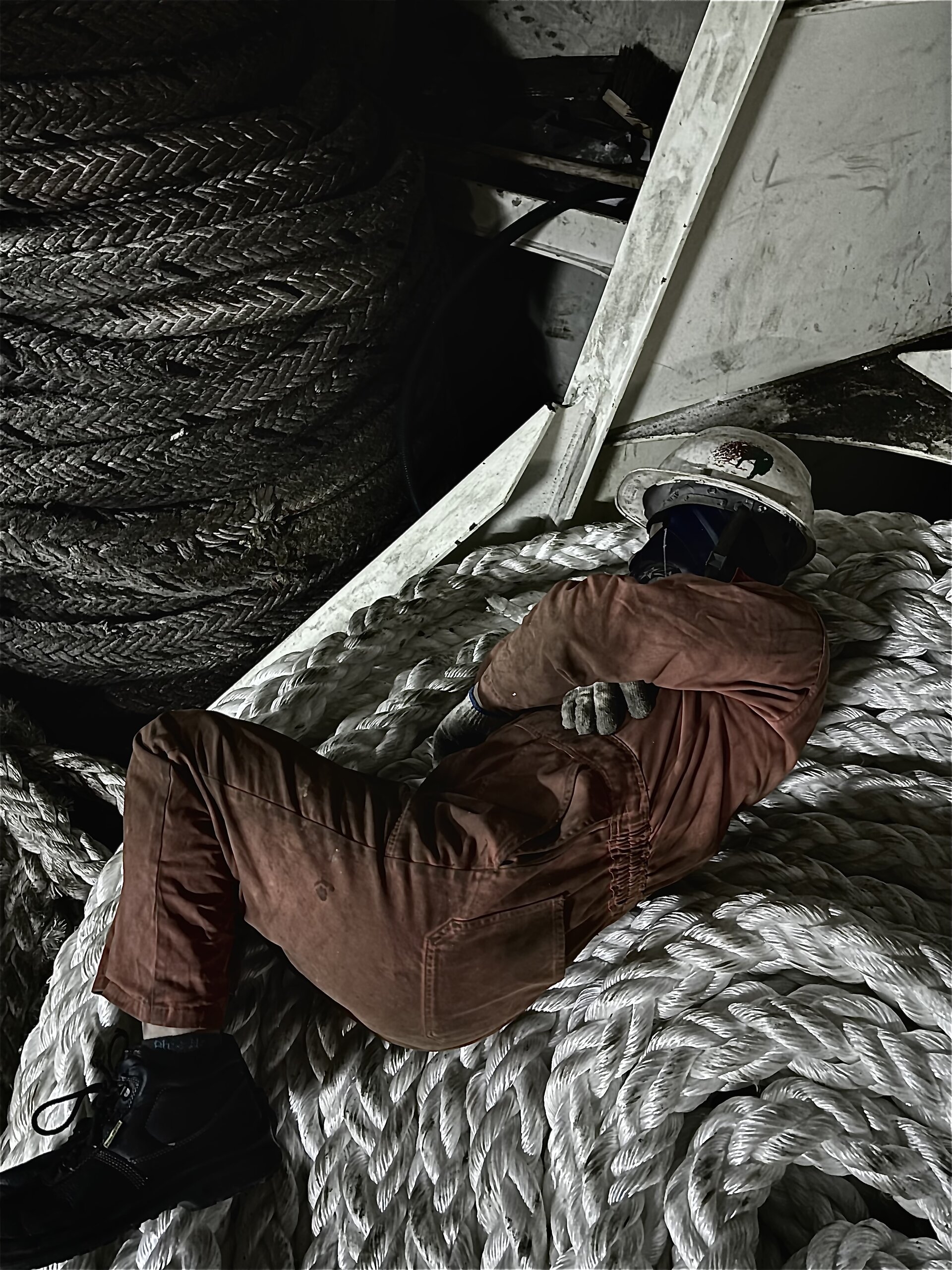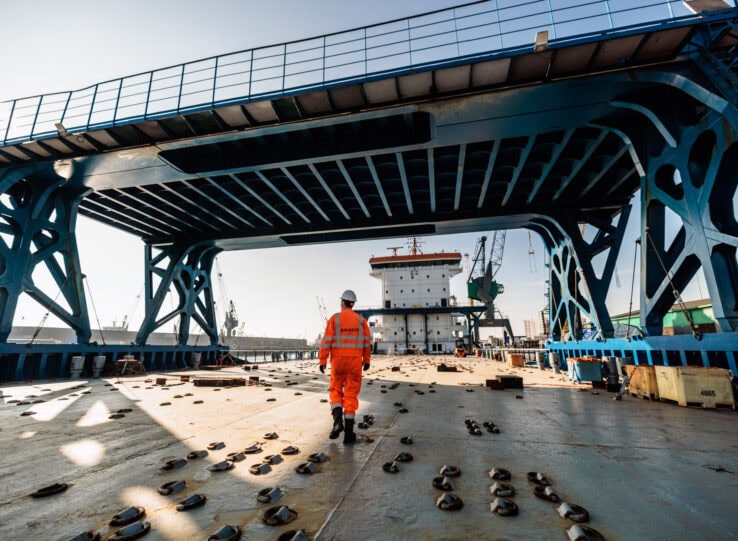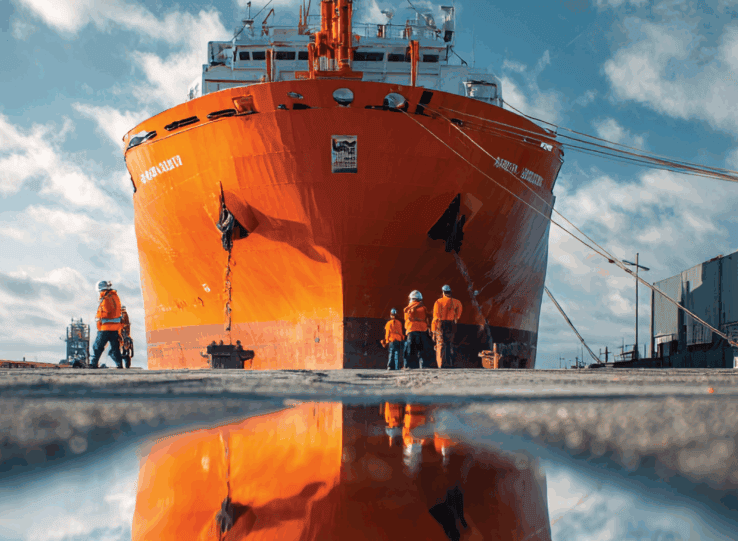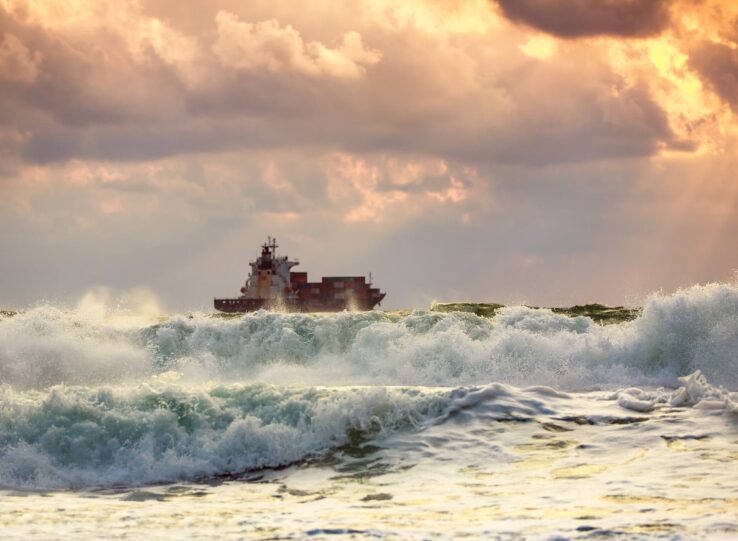Fatigue steals more than sleep. It steals focus, health, and time.
Most of us think of fatigue as being tired after a long shift, a rough port call, or a sleepless night on watch. In reality, fatigue runs much deeper. It’s not simply about feeling sleepy. It’s about what happens to your body and mind when rest is constantly disrupted. When stress never lets up. And when the “normal” routines of life ashore don’t apply at sea.
Seafarers are unique. Workplace and home are the same place for months. Fatigue has many causes: long working hours, solitude, irregular watch schedules, night shifts, heavy noise and vibration, excessive paperwork, and limited time for quality rest. Now add inspections to the workload. Also, add patchy connectivity with family. These are not occasional issues. This is life at sea.
Fatigue is more than being tired. It’s a state of exhaustion that wears down health and attitude to safety. Over time, it doesn’t just slow reactions on the bridge or in the engine room. It compromises situational awareness and raises the risk of long-term illness.
PART I: Under Pressure – Your Heart

Fatigue clouds the head and keeps stress high. Blood pressure rises. The heart takes a steady load. Seafarers carry big risks: about 45% have high blood pressure and more than 40% are overweight (Sagaro et al., 2023). These risks rarely travel alone. The same meta-analysis found that hypertension, excess weight, smoking, and high cholesterol tend to cluster in the same person (Sagaro et al., 2023). If fatigue pushes sleep and diet off course, other risks join in. The impact on the heart grows.
Why does fatigue play such a big role? Because broken sleep and night shifts disturb the body clock. Metabolism slips. The body handles sugar poorly, raising diabetes risk over time (Rogers et al., 2024). Appetite hormones drift: ghrelin (hunger) rises while leptin (satiety) falls, leading to roughly 250 extra calories per day on average (Chaput et al., 2023). At sea, that often means more snacks and heavier meals.
In short: Fatigue → broken sleep → more eating and sugar problems → weight gain → higher blood pressure → heart at risk.
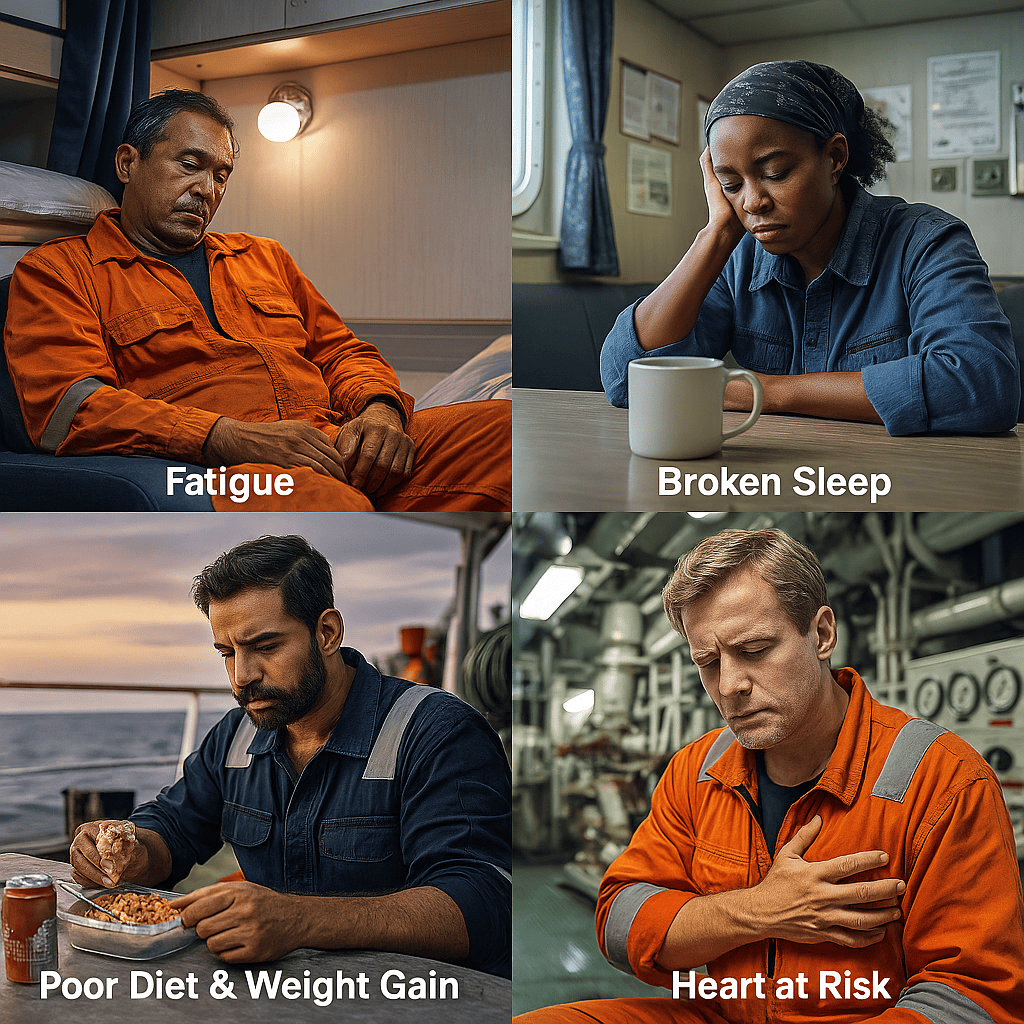
The role of noise
Noise is a constant companion: engine throb, machinery hum, cargo ops. Over time, it damages hearing and fuels fatigue. Engine-room noise often exceeds safe limits, and many seafarers don’t use hearing protection consistently (Kim et al., 2024). This isn’t only about ears. Hearing loss has been linked with heart disease, high blood pressure, and stroke (Fuquay Law Firm, 2024). Noise stresses the body, disturbs sleep, and deepens fatigue. When hearing loss develops, the effort to catch alarms, radio calls, and even simple conversations adds more strain.
The cycle feeds itself. Fatigue makes ear protection less likely. Constant noise blocks proper rest. Body and hearing both take a beating.
PART II: The Hidden Toll on Mental Health
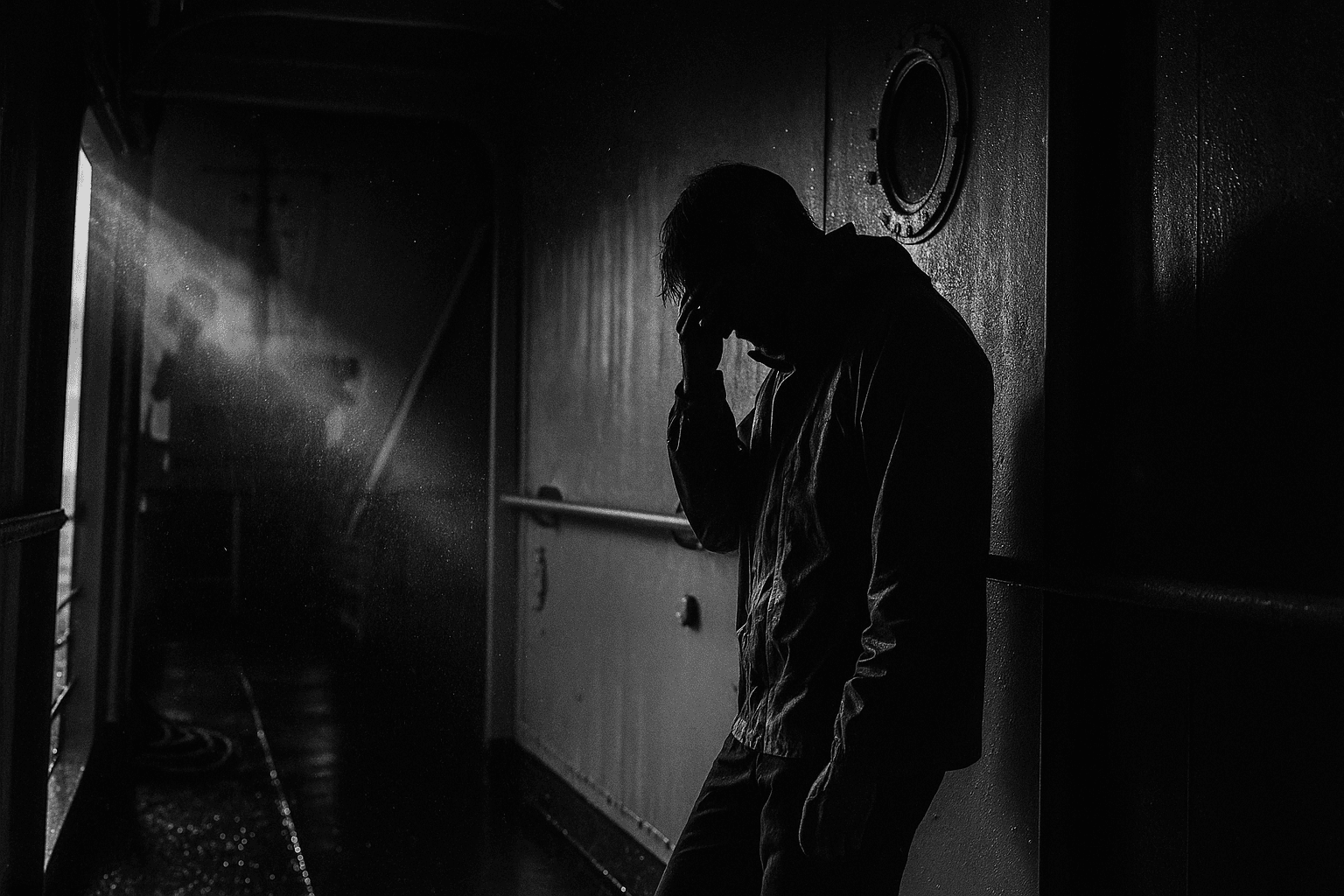
Every seafarer knows the mental strain: long contracts, homesickness, inspection pressure, back-to-back port calls. Fatigue magnifies all of it. Broken sleep doesn’t just make you groggy. It makes emotional control harder and can tip into irritability, anxiety, or depression.
A recent survey spanning 12 countries found that depression and anxiety levels varied by nationality, ship type, and working conditions – yet fatigue and poor sleep were consistent drivers of poor mental health (Svetina et al., 2024). This is not a single-flag or single-region issue. It’s global.
This isn’t only about mood. Fatigue mixed with loneliness, bullying, or lack of support wears people down. Broken sleep plus constant stress weakens immune defenses, which is why many say they “catch everything” when they’re run down.
What can be done?
There’s no magic cure for fatigue at sea, but there are ways to fight back. Some are in your control. Others depend on company systems and support.
- Protect your sleep. Earplugs. Dark cabins. Routines that defend rest. Treat rest as non-negotiable.
- Cut the workload. Endless administrative workload steals rest. Smarter digital systems for reporting and port clearance are giving those hours back to you and your team.
- Guard your hearing. Wear protection equipment at any time in noisy areas. Saving your ears also lowers stress and fatigue (Kim et al., 2024).
- Watch the signs. Headaches, irritability, persistent tiredness, low mood – don’t ignore them.
- Check your health. Monitor blood pressure, blood sugar, hearing, and mental health. Telemedicine and digital tools bring shore doctors closer to the ship, so small problems get caught early.
How Smarter Systems Cut Fatigue (and Risk)
Port paperwork steals sleep. During port calls, admin work can eat hours meant for recovery. Modern tools from CFARER fix this:
- Pre-filled port forms. Solutions like Navigator Port and Port Mate generate pre-filled port documents, reducing manual entry and typos.
- From hours to minutes. Pre-arrival prep drops from hours to under 20 minutes, reclaiming real rest time.
- Fewer errors, calmer crews. Automation reduces mistakes and rework. Stress falls before, during, and after clearance.
- Work & Rest done right. A modern, user-friendly Work and Rest feature records and reports hours smoothly, supporting compliance across regimes.
- Compliance helps health. Consistent work/rest compliance prevents inadequate rest, a core driver of fatigue.
- Fleet view for shore. Shore teams see risks early, support crews faster, and protect recovery windows.
Less admin and fewer corrections lead to more rest and better health. If you ever need an argument for a digital solution, read that line again.
Summary: The Bigger Picture
Fatigue is one of the biggest threats to safety at sea, and one of the most overlooked risks to long-term health. This isn’t only about avoiding today’s incident. It’s about protecting people from heart disease, hearing loss, diabetes, depression, and more over a full career at sea (Sagaro et al., 2023; Kim et al., 2024; Rogers et al., 2024; Chaput et al., 2023; Svetina et al., 2024).
The industry is waking up. Seafarer health sits at the heart of safe, efficient operations. Better health checks. Early-warning systems. Less paperwork. These aren’t box-ticking moves. They are practical steps that let crews rest and sail safer. Because at the end of the day, your health is the most valuable cargo you’ll ever carry.
Smarter systems. Healthier crews. Safer voyages.
#MakingMaritimeLifeEasier
About the company involved in creating this article
Health4Crew — how it helps (crew + office): Health4Crew adds a ship-savvy healthcare layer around day-to-day operations: digitised PEMEs become clear baselines, simple trend flags highlight changes in blood pressure/glucose/weight/meds, and quick, doctor-led check-ins provide practical. For crews, that means earlier interventions and calmer decisions; for Crew/HSQE, clean clinical/incident notes and audit-ready reporting that cuts duplicate admin and helps reduce avoidable disembarkations and diversions.
References
- Chaput, J-P., McHill, A.W., Cox, R.C., et al. (2023). The role of insufficient sleep and body clock disruption in obesity. Nature Reviews Endocrinology, 19, 82–97.
- Fuquay Law Firm. (2024). Excessive Noise and Vibration: A Maritime Hazard.
- Jonglertmontree, W., et al. (2022). Mental health problems and their related factors among seafarers: a scoping review. BMC Public Health, 22, 282.
- Kim, S., et al. (2024). Impact of ship noise on seafarers’ sleep and fatigue. Applied Sciences, 14(7), 662–670.
- Rogers, A., Zhang, J., Gadde, K.M. (2024). Sleep, circadian rhythms, and diabetes: mechanisms and future directions. Diabetes/Metabolism Research and Reviews, 40(4), e3667.
- Sagaro, G.G., Di Canio, M., Battineni, G., & Amenta, F. (2023). The magnitude of heart disease risks in seafarers: a study combining data from many groups. Journal of Personalized Medicine, 13(5), 861.
- Sagaro, G.G., et al. (2024). Self-reported diabetes among seafarers: linked to overweight, obesity, and long working hours. International Maritime Health, 75(1), 19–28.
- Svetina, M., et al. (2024). Factors impacting seafarers’ mental health and career intentions: a study of seafarers from 12 countries. INQUIRY.
- West of England P&I Club. (2025). The Rising Tide of Fatigue Among Seafarers.


